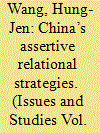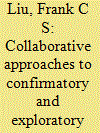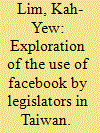|
|
|
Sort Order |
|
|
|
Items / Page
|
|
|
|
|
|
|
| Srl | Item |
| 1 |
ID:
162610


|
|
|
|
|
| Summary/Abstract |
Combining data from a content analysis of leading newspapers, a random-sampled national survey (n=1,306), and a semantic network analysis of Facebook postings, this study applies Network Agenda Setting and attribute-priming effects to examine how perceptions of risks, benefits, and trust in government regulation influenced the public’s evaluation of the Presidential performance in the 2012 controversy over imports of American beef in Taiwan. The results show that only perceived risks to health directly affected the public’s evaluation of the President; other types of risks damaged the public’s trust in government regulation, which consequently harmed their evaluation of the President’s performance.
|
|
|
|
|
|
|
|
|
|
|
|
|
|
|
|
| 2 |
ID:
162608


|
|
|
|
|
| Summary/Abstract |
In the past decade, observers in Western countries have been increasingly challenged to describe China’s rising power in one of two ways: as contributing to established world systems, or as a growing threat fulfilling certain predictions made at the end of the Cold War. For some, perceptions of increasingly assertive regional behaviors confirm that China’s self-proclaimed policy of pacifism is being used to cloak selfish national interest and power goals. The current international relations (IR) literature tends to treat China’s assertiveness as evidence that it is indeed a threat, with few attempts to conceptualize assertiveness as a relational strategy. In this paper, the author uses eight current and historical cases involving four relational strategies — engagement, boycotting, reciprocation, and pressing — to examine conventional assessments of assertiveness that focus solely on perceptions of and responses to threatening statements and behaviors made in defense of Chinese national interests. In the end, this paper tries to contribute to the general IR literature that has tended to misinterpret China’s assertiveness, which is actually an identity issue regarding bilateral relationality instead of power or interest calculations.
|
|
|
|
|
|
|
|
|
|
|
|
|
|
|
|
| 3 |
ID:
162609


|
|
|
| 4 |
ID:
162612


|
|
|
|
|
| Summary/Abstract |
Previous studies have found that how to win an election is always an important question for legislators. Their behavior in lawmaking and constituency service is also associated with their aspirations for re-election. In the era of booming social media, how legislators can use social media to increase their chances for election and re-election has become a compelling issue. This study argues that legislators do indeed maximize the benefits of social media to win elections. On this account, this study intends to explore two main questions: (1) What kind of messages legislators choose to convey to voters on their fan pages; and (2) Whether the political characteristics of legislators affect the types of the messages they convey there. In this study, posts were collected from the fan pages of 25 Taiwanese legislators. These text messages were then converted into numerical data that could be quantitatively analyzed with the content analysis method. It was found that legislators tend to start with soft messages in their communications with the public. They share some details of their daily schedules and everyday lives with their voters before they begin image building and posting political material. This study also found that the political characteristics of legislators, including their party membership, their status either as a district or proportional representation (PR) legislator, and their incumbency all affect the content of posts on their fan pages. For example, compared to Kuomintang (KMT) and Democratic Progressive Party (DPP) legislators who share information from their daily lives, New Power Party (NPP) legislators prefer to share only political information. PR legislators devote more attention than district legislators to criticizing the government on their fan pages. Incumbents are significantly less likely than challengers to share daily information, but more likely to share political information. This study found that the aforementioned differences have resulted from the many ways that different types of legislators use to increase their chances of winning an election.
|
|
|
|
|
|
|
|
|
|
|
|
|
|
|
|
| 5 |
ID:
162611


|
|
|
|
|
| Summary/Abstract |
This study examines the moderating effects of social media use on regionalist voting behavior in South Korea. Analyzing the survey data conducted during the 2017 Korean presidential election, we test how social media functions in electoral processes, particularly with respect to region-based voting in the Korean electorate. The findings of this study reveal that social media use affects region-based voting behavior among the Korean electorate by connecting people with different regional backgrounds in online political communication. That is, social media use can create “bridging” social capital rather than “bonding” social capital in society. In this respect, results differ significantly from findings in the 2012 presidential election. In 2012, only the independent effects of social media existed with a liberal bias, without revealing interaction with regional dummies. These independent effects disappeared in 2017, and different kinds of social media were statistically significant only when they functioned as moderating variables for regional dummies. This implies that as the functions of social media in the Korean election process have evolved in more complexity, they now are able to affect progressive as well as conservative voters.
|
|
|
|
|
|
|
|
|
|
|
|
|
|
|
|
|
|
|
|
|